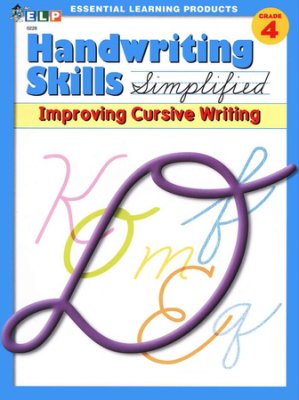Fourth Grade Language Arts
We have taken all the guesswork out of Language Arts and simply offer lesson plans that are effective, efficient and fun. Our CGA program provides activities families can do together along with specific grade-level appropriate material that cover all the academic needs. This program is the easiest to follow because each weekly lesson is provided and sequences weekly for parents to follow. Additionally, the power standards checkpoints are provided throughout the year. So you can easily upload the submissions into Ally and check that your child is competent.
Family Literacy and Skills Curriculum Map by Grade Level
Week 1: Homepage with Links to the First Lesson for grades K-3.
Explanation of the Family Literacy and Skills Program.
Each week, there will be three days of skill practice in order to:
Family literacy is available for all grades and reading levels placing an importance on phoneme awareness, phonics and decoding, but then going beyond with syntax, morphology, and semantics. Reading needs a brand new circuit of knowledge and the Family Skills Literacy program can change the thinking through a print and digital adaptive, blended instruction. Each week they will connect the world around them to their own experiences through fluent cognitive awareness.
Family Literacy expands vocabulary by exposing the students to new words and ways they can sound out and find the meaning of words through the science of reading, by increasing their ability to expand their vocabulary, spelling, grammar skills and helping the student be a part of this entire comprehension, systemic approach to literacy.
Family Literacy sharpens the mind through being a part of the entire comprehension and engaging the students’ brains tapping into their critical analysis and empathy to help make judgments and focusing on the importance of messages in a single word and simple phrases so by the end of the year students will have an automatic, fluent, comprehending brain.
Reading and writing are great entertainment and have to be part of this entire comprehensive process. Family Literacy will allow your student to travel to a new world each week connecting their thoughts and feelings. Reading is not only about uncovering new discoveries, but a vehicle to challenge and reflect.
We have the absolute best academic support for early learning, engagement, and mastery. CGA family literacy helps build a sense of self understanding and facilitates evaluation of individual needs. The more a student knows about a word, the quicker the student will read and comprehend words and stories.
Humanities classes are designed to stimulate thinking and to help develop strong writing skills for the students. Based on student interaction and engagement, these courses will strengthen deeper reading skills, critical thinking, productive collaboration, accountability, and encourage follow-through.
Language Smarts™ Level E (4th grade) is the fourth addition to our award-winning Language Smarts™ series. This colorful, fun, 400-page book teaches reading, writing, spelling, punctuation, grammar, and thinking skills students are expected to learn in fourth grade and several skills and concepts normally taught in fifth grade. Language Smarts™ can serve as a complete curriculum for language arts or as a supplemental resource. Improve your students’ language arts skills while you develop their critical thinking skills with these easy-to-use lessons and activities. Teaching and practicing language arts skills and concepts has never been easier! No lesson preparation needed! Each section introduces a specific topic, followed by appropriate practice and application activities. These engaging and colorful lessons develop critical thinking and language arts skills through a variety of activities and different genres: parts of speech, punctuation, sentences and paragraphs, homophones and homographs, fact or inferences, writing, and more! Learn More
Notes: Covers all language arts skills and doesn’t need much parent involvement. Colorful pages.
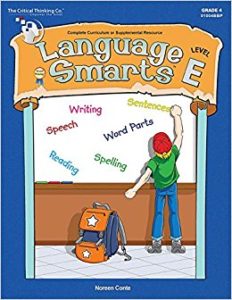
Essentials curriculum uses proven, research-based methods to teach remedial students ages 8 to adult to read, spell, and write successfully. Essentials improves the spelling and reading skills of all learners by providing linguistically accurate phonics instruction, fluency practice, morphology and vocabulary development, grammar, and composition. Clear instructions and scripted lessons allow teachers, tutors, and parents to learn alongside their students, developing their own understanding of the structure of English as they teach. Multi-sensory instruction and a variety of multi-sensory exercises allow teachers to customize the curriculum for the needs of their students, paving the way to success in reading for all kinds of learners. Learn More
Comes with: Essentials Teacher’s Guide, Essentials Student Workbooks, Spelling Journal, Basic Phonogram Flash Cards, Spelling Rule Flash Cards, Advanced Phonogram Flash Cards, Grammar Flash Cards, Phonogram Game Cards (2 sets in different colors), Phonogram Game Tiles, Phonogram and Spelling Rule Quick Reference, Spelling Analysis Card.
Notes: Logic of English is a very solid phonics foundation that will start at square one and progress very quickly. It is meant for remediation students above age 8. It is quite parent intensive but may raise reading level significantly. Placement Help
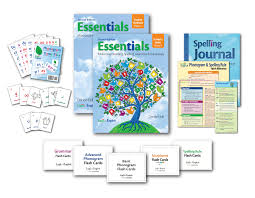
This program is highly structured. Lessons are taught with continual teacher-student interaction. Students then complete worksheets or writing assignments from their workbooks. CD’s present jingles and the question and answer flow for different types of sentences. The teacher’s manual explains the methodology and offers useful teaching tips and some creative ideas. Learn More
Notes: Because the methodology and concepts are repeated from year to year. You can begin to use this program at any level—you need not go back to level 1.
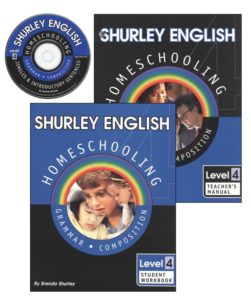
Design a new plant species. Evaluate the relationship between a Native American boy and a pioneer boy who are able to learn from one another in spite of their differences. Experiment with magnets and electricity. Learn about simple machines and examine how they are used in a colony of rats in the The Rats of NIMH. At Moving Beyond the Page we believe that children learn when they are actively engaged in their learning. Beginning with the Age 8-10 level, we use many hands on and engaging science kits to teach your child the science topics being covered. You cannot find a more hands on science curriculum available for homeschoolers. Learn More
Comes with: Each Concept comes with a variety of Literature, Manipulatives, a Teachers manual and Student Activity book.
Notes: Moving Beyond The Page is a literature based curriculum. It does become overwhelming with so many activities. Our favorite way to use it is to pick and choose between activities and not become bogged down by doing all of them. Placement Test
Your student will learn exciting new concepts, including words with multiple suffixes, fifteen new phonograms, and methods for decoding multi syllable words – and continue to establish a firm foundation for a lifetime of learning. Every component of reading is taught: decoding (phonics and structural analysis), vocabulary, fluency, and comprehension. Learn More
Needs: Teacher Manual, Student Activity Packet, 2 Readers, Interactive kit.
Notes: All About Reading is great for struggling readers, but it can be too repetitive for quick learners. Placement Test
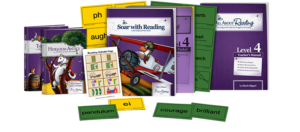
Content provides research-based, multi-sensory instruction best for beginning and struggling readers. Reinforcement for every skill in the “1/2 books” series allows for extra practice. Consistent exercise formats with simple directions and concrete examples allow students to work and learn independently. Learn More
Needs: Semester 1- Book 7, Semester 2- Book 8 (1/2 books are available only if extra practice is needed)
Notes: Great for the child who is beginning to read but needs practice.
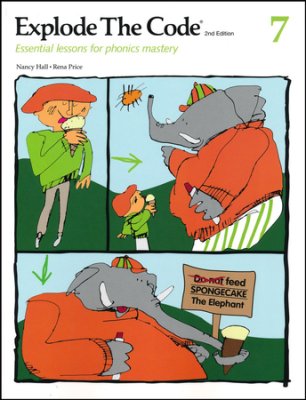
Makes learning to read interesting and engaging for kids, with great online reading games and activities. Children love the games, songs, golden eggs and other rewards which, along with feeling proud of their reading, really motivate children to keep exploring and learning. Learn More
Because it is delivered over the Internet, Reading A-Z is a constantly changing program. Each month, Reading A-Z adds new books, lesson plans, and other resources, thus continually expanding its wealth of materials. Learn More
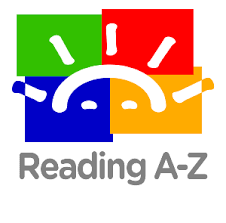
American Spirit continues to guide students through the skill development stage of spelling. Students will read about various people and events from American history, with a gradually increasing reading level. At the same time, the emphasis on the mastery of everyday words continues, building a strong foundation for the next stage of spelling. Just as in the previous level, American Spirit utilizes the three core activities of Spelling You See: chunking – which provides hands-on experience with English’s many irregular letter patterns, copy work – which requires the brain to pay attention to details in print, and dictation – which gives an opportunity for student to demonstrate decoding and encoding in a meaningful context. Learn More
Comes with: Instructors Handbook and Student Pack.
Notes: This curriculum runs a little below level.
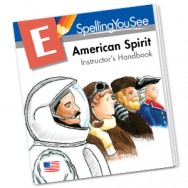
List words are mostly two-syllable words and some complex single syllable words and some multi-syllable words. Lessons contain games such as crossword puzzles, word search, definition matching, unscrambling words, identifying misspelled list words in a paragraph, alphabetizing words, complete the sentences, match the picture to the list word, and identifying words that make certain sounds. Learn More
Comes with: Workbook and Answer Key.
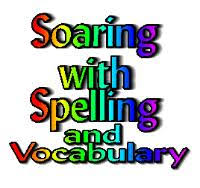
In Level 3, your student will continue to learn encoding skills, reliable spelling rules, and multisensory strategies for spelling, along with exciting new concepts including 10 new phonograms, the jobs of Silent E, words with C+l-e syllables, contractions, homophones, consonant and vowel suffixes, and past tense. Phonological awareness and encoding skills are taught throughout Level 3. Learn More
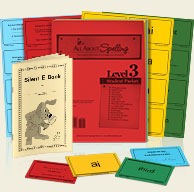
Spelling Workout has all the components you need to lead students from simple sound-letter relationships to more complex spelling patterns. Students learn spelling skills based on phonics through unique, cross-curricular reading passages, practice, and high-interest writing activities. Packed with flexible lessons, motivating activities, including fun riddles and puzzles, this dynamic program leads students to spelling success! Learn More
Notes: My personal favorite Spelling program as it is phonics based and includes writing and editing.
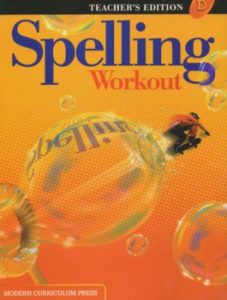
Level 4 -provides easy-to-use materials for introducing this comprehensive writing approach to young students; an approach that understands the need for one-on-one instruction and focuses on copy work (putting words on paper) and narration (putting ideas into words). Learn More
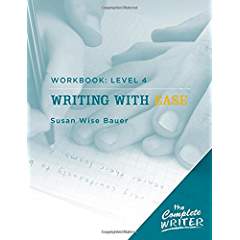
Grades 4 – 6 – Teach writing skills using this innovative new approach. The Four Square method can be used with all forms of writing and will fit any reading or language arts program. This step-by-step approach is built around a simple graphic organizer that first shows students how to collect ideas and then helps them use those ideas to create clear and polished prose. Open-ended reproducibles make the technique accessible to writers of all ability ranges. Learn More
Notes: A writing method that is easy to teach.
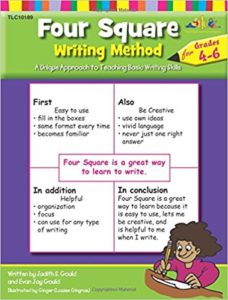
This level covers direct, indirect quotations, dialogue, the writing process, creative writing, how-to-writing, personal narrative, descriptive writing, and persuasive writing. Learn More
Comes with: 2 Workbooks and Answer Key.
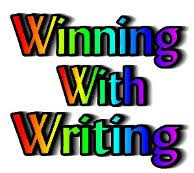
Recorded live with Mr. Andrew Pudewa, this four-DVD writing course for elementary students new to IEW lays a solid foundation of writing skills. Over the course of 15–30 weeks, students will learn how to effectively use a wide range of structural models and stylistic techniques in their compositions, as they write on a variety of enjoyable fiction and non-fiction topics. Included with the student handouts are complete teacher’s notes, source texts, assignments, and checklists. (Grades 3-5) Learn More
Comes with: Student Notebook and Instructional DVDs.
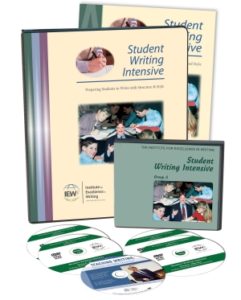
The most overlooked stage in the writing journey! (9-10 yr olds)
Do you wonder how much support to give to your child’s writing? Are you worried that you might be helping too much, or that your child won’t become an independent writer if you help your child write, revise, and edit his or her work? You’re not alone. The truth is: educational development in children grows in direct proportion to the appropriate level of support offered by a caring experienced adult. You are that person!
Successfully navigate the Partnership Writing phase (no more “blank page, blank stare” syndrome!) with our Year-Long Language Arts Plan and 10 Monthly Writing Projects. Parents are given clear instructions about how much support to give to a child’s writing project—what’s too much, what’s not enough? You’ll go on a journey of joyful collaboration with your child, who will gain confidence and excitement about writing.
The Partnership Writing program product:
Partnership Writing helps you create a language-rich environment, suggests a daily routine for your language arts practices, and provides you 10 month-long writing projects/assignments (the “what to write”) to last all year. Learn More
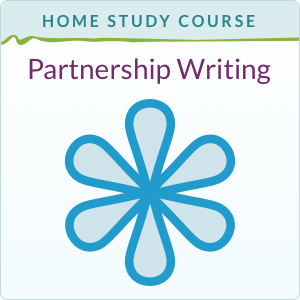
This workbook, accompanying the Level 4 Instructor Guide in the First Language Lessons complete elementary grammar series, uses classical techniques of memorization, dictation, and narration to develop your child’s language ability in the important, foundational years of language study. The Student Workbook provides complete worksheets for the student, making it possible for busy parents and teachers to spend more time teaching and less time preparing. Learn More
Comes with: Teacher Edition and Student Workbook.
Notes: Is very structured and requires parent involvement.
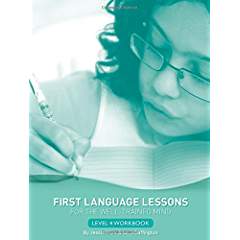
Diagramming compound subjects and predicates, combing sentences, identifying two subjects and two predicates in a sentence, diagramming questions and commands, direct quotations, indirect quotations. Writing a paragraph, concrete and abstract nouns, nouns of direct address, compound nouns, noun suffixes, dictionary skills, giving directions predicate nouns, contractions formed with pronouns, helping verbs, verb phrases, verb tenses, writing a narrative paragraph, diagramming adjectives and adverts, double negatives, writing a descriptive paragraph, prepositional phrases used as adverbs and adjectives, diagramming prepositional phrases, conjunctions, interjections, writing a book report, raise and rise, let and leave, lend and borrow and teach and learn. Learn More
Comes with: Workbook and Answer Key.
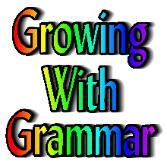
Beginning 2 (grade 3-5) Editor in Chief® Beginning 2 improves students’ grammar, punctuation, spelling, capitalization, and attention to detail using a standards-based thinking approach rather than drill and practice. This effective method teaches students to carefully analyze and edit stories. This book includes 18 lessons in grammar and mechanics. Students identify and circle errors in each story and write their correction. The grammatical and mechanical errors in the paragraphs are based on general instructional guidelines for specific grade levels; the content level, however, is ungraded, allowing usage of these materials at many instructional levels. Writing styles and content are varied to sustain interest and to broaden the students’ exposure to different writing formats, such as letters, stories, and dialogue. The illustrations integrated into the context of the activities further spark student interest. The skills developed can be applied to the students’ own writing. Detailed answers are also included. Learn More
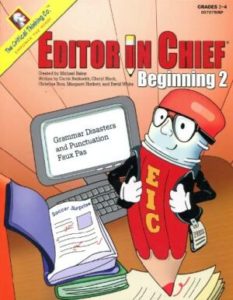
Beginning 1 (grades 3-4) Students learn the meaning and spelling of roots, prefixes, and suffixes commonly used in English. Learning these word elements dramatically improves spelling and the ability to decode unfamiliar words. The activities focus on using these words in context to help students incorporate each word into their vocabulary and retain the correct spelling. There are periodic reviews to make sure students retain what is taught in the lessons. Word Roots books will add hundreds of words to your students’ vocabulary and greater depth to their thinking and writing. Learn More
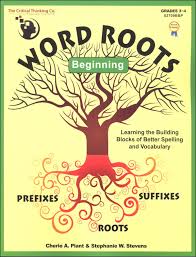
Beginning (grade 3-4) The standards-based critical thinking activities of Reading Detective® develop the analysis, synthesis, and vocabulary skills students need for exceptional reading comprehension. The activities are especially effective at helping students understand more challenging reading concepts such as drawing inferences, making conclusions, determining cause-and-effect, and using context clues to define vocabulary. Students read and analyze short literature passages and stories that include fiction and nonfiction genres. Then they answer multiple-choice and short-response questions, citing sentence evidence to support their answers. Learn More
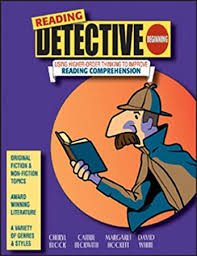
(Grades 4-7) The Language Mechanic is a comprehensive program that uses fun examples and logical reasons to eliminate the confusion students often feel while learning the mechanics of language. This book demonstrates and reinforces why each language rule is important. Lessons begin with a “grabber” – a humorous miscommunication that results when a rule is broken. Examples are followed by an explanation of the specific rule, the logic behind it, then guided and independent practice. Learn More
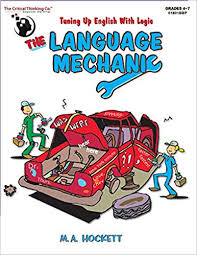
Zaner-Bloser Handwriting is a complete handwriting program that can be taught in as little as 15 minutes a day! The Zaner-Bloser style teaches a cursive alphabet that is made up of four basic strokes: the undercurve, downcurve, overcurve, and slant.
This fourth grade cursive workbook provides cursive reinforcement. Colorful and engaging exercises include tracing and writing letters, joinings, words, sentences, and paragraphs. Review and application exercises are included throughout. Students will think about shape, size, spacing and slant as the keys to legibility. The last unit is “using what you have learned” and focuses on real-life applications of cursive handwriting in situations like writing an invitation, writing a friendly letter, taking notes, and more. Learn More
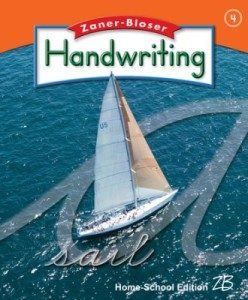
D’Nealian Handwriting is the original continuous stroke handwriting program! It’s based on a few simple connecting strokes that children use to write in cursive.
Three units are included in this Grade 4 workbook: Reviewing Manuscript Letters, Writing Cursive Letters, and Applying Handwriting Skills. Students will practice writing capital and lower-case letters (paying particular attention to the finer details of each letter’s strokes), copy the provided letters/words/sentences provided, practice correct spacing, and finish assignments based on real-life situations. Learn More
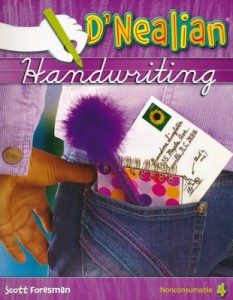
Mastering Cursive Writing, Level D guides in the development of legible handwriting and provides opportunities for practice. Learn More
